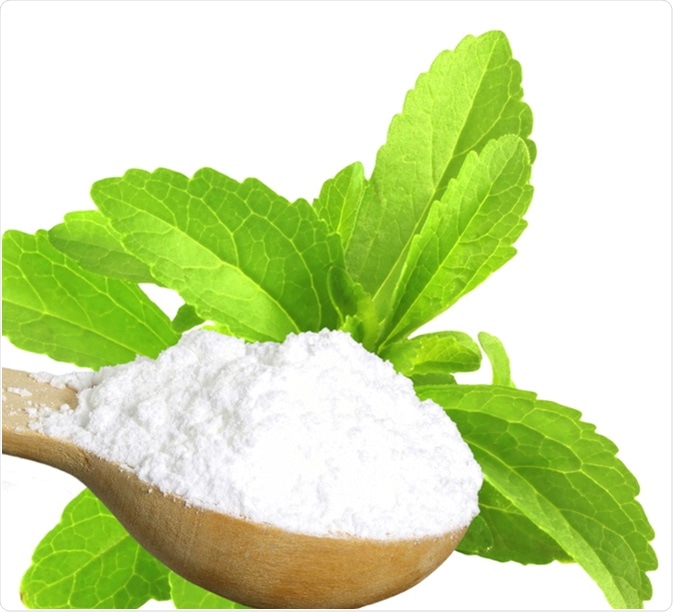By Jeyashree Sundaram, MBA
Stevia is a natural sweetener obtained from a shrub called Stevia rebaudiana. It is generally found on the continent of South America. It is 200–400 times sweeter than sucrose and it is a non-caloric sweetener. Hence, it replaces sugar, corn syrup with high fructose, and other artificial sweeteners.
The sweetness of stevia is due to compounds present in the leaves which are extracted by soaking these leaves in water. The sweet extract contains steviol glycoside, which has two main components: Rebaudioside A and Stevioside. Stevia is rich in flavonoids and terpenes. Steviol glycosides are partially metabolized in the body and digested in the upper gastrointestinal tract, stomach, and small intestines. Stevia finds its use in jams, soft drinks, ice cream, cakes, desserts, dairy products, and alcoholic beverages.

Sugar substitute Stevia plant and extract powder. Image Credit: govindji / Shutterstock
Benefits of Stevia
Stevia has enormous advantages in the field of:
Therapy: The therapeutic effects of stevia include
- Anti-hyperglycemic—it has the ability to increase the activity of pancreatic cells, insulin sensitivity, and promote insulin production and utilization. It is helpful in the treatment of Type-2 diabetics.
- Anti-hypertensive—stevioside reduces the blood pressure by preventing calcium ions from entering the blood vessel endothelial cells and thus reducing vasoconstriction in hypertensive patients.
- Antioxidant—it contains huge amounts of natural antioxidants including opigenin, kaempferol, and quereitrin. These help to prevent damage to DNA strands, angiotensin-induced cell propagation, and endothelin secretion.
- Anti-carcinogenic—steviol glycoside consists of four constituents, namely, stevioside, rebaudiosides A, rebaudioside C, and ducloside A, which strongly inhibits the inflammation caused by 12-0-tetradecanoylphorbol-13-acetate (TPA), indicating its anti-carcinogenic activity.
- Antimicrobial—stevia has the ability to evade the growth and reproduction of harmful bacteria and prevent other infections.
- Anti-inflammatory and immunomodulatory—stevia is also helpful in decreasing inflammation and immuno-modulation. It reduces the synthesis of inflammatory agents in lipopolysaccharide (LPS)-induced THP-1 cells by intervening in the I-Kappa-B kinases (IKK-beta) and Kappa B signaling pathways.
Medicine: The medicinal effects of stevia include:
- Cardiovascular activity—the cardiotonic action of stevia helps in enhancing the actions of the circulatory system of human body when it is used for a long period.
- Digestive tonic activity—stevia helps in improving the digestive system and maintaining appetite.
- Dermatological activity—stevia is considered to be an effective medicine in the treatment of various skin problems such as acne, seborrhea, dermatitis, eczema, and wounds, helping them to heal without creating a scar. Regular use of stevia also improves the skin texture and prevents sagging skin.
Health Concerns
The consumption of stevia can induce various side effects in humans, which include bloating, nausea, paining and weakening of muscles, dizziness, and allergic effects.
In addition, it may also interact with drugs used for cancer, microbial infections, calcium channel blockers, and lowering cholesterol levels, and lead to other side effects.
The diuretic action of stevia inhibits the natural mechanism of lithium removal from the body, leading to the accumulation of lithium in the body, causing severe side effects. Various experiments were carried out in rodents based on this factor. The results indicated the occurrence of infertility in rodents due to lithium accumulation.
Stevia has an adverse effect on the blood flow, renal activity, flow of urine, and excretion of sodium in patients with renal disease. It is not recommended for women during pregnancy and lactation.
Safety Aspects
Stevia is considered to be safe and harmless compared to artificial sweeteners. Experimental studies have been carried out for a long time to investigate its health outcomes on humans.
Toxicologists at University of California carried out work to investigate the development of cancer due to genetic mutation caused by the intake of steviosides.
In Japan, artificial sugars are completely banned and they started using stevia as a natural sweetener. Also, they performed several experiments and affirmed that the use of stevia is safe.
The Food and Drug Administration of U.S (FDA) approved the use of Rebaudioside.A (extracted from stevia leaves) as safe for use by humans. However, it has not approved the use of whole stevia as it is found to cause certain health issues.
The European Food Safety Authority (EFSA) has approved the use of steviol glycosides for human utilization with an Advised Daily Intake (ADI) of 4 mg/kg. Later in 2010, the European Union confirmed that it is safe to use steviol glycosides as food additives.
The Joint Expert Committee for Food Additives (JECFA) revised the safety of steviol glycosides in 2000, 2005, 2006, 2007, and in 2009 and fixed the safety margin for daily intake level as 4 mg/kg. The research panelists considered the use of steviol glycosides that fulfill the conditions of JEFCA to be non-carcinogenic and non-genotoxic.
Further studies are required for clarifying the role of stevia in humans in weight management and energy reduction.
References
- https://dergipark.org.tr/en/
- https://www.ncbi.nlm.nih.gov/pmc/articles/PMC4890837/
- https://medlineplus.gov/druginfo/natural/682.html
- https://www.fda.gov/
- https://www.ncbi.nlm.nih.gov/pubmed/19961353/
- https://www.ncbi.nlm.nih.gov/pmc/articles/PMC2900484/
- https://www.ncbi.nlm.nih.gov/pmc/articles/PMC3198517/
- http://www.naeb.gov.rw/index.php?id=137
- https://www.ncbi.nlm.nih.gov/pubmed/9806223
- http://www.naturalhealthresearch.org/stevioside-effective-for-high-blood-pressure/
- https://www.acefitness.org/certifiednewsarticle/1644/the-truth-about-stevia-the-so-called-quot-healthy/
- http://www.nhs.uk/Livewell/Goodfood/Pages/are-stevia-plant-extracts-safe.aspx
- http://onlinelibrary.wiley.com/doi/10.2903/j.efsa.2010.1537/abstract
Further Reading
Last Updated: Dec 29, 2022